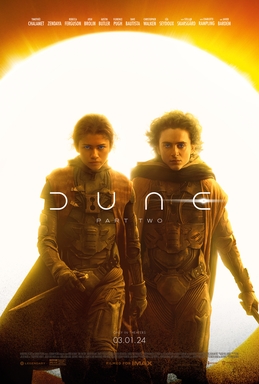Back in 2021 I went to see the first installment of ‘DUNE’ and was slightly 'put out' to discover that it ended half way through the (first) book.
It was the second big-screen attempt to make a movie of the book, if you don’t count the first ‘Star Wars’, that borrows shamelessly from Frank Herbert’s Si-Fi classic, and I thought it a lot better.
Now the long-awaited second part has been released.
| Directed by Denis Villeneuve Screenplay by Denis Villeneuve, Jon Spaihts Based on Dune by Frank Herbert Starring Timothée Chalamet, Zendaya, Rebecca Ferguson, Josh Brolin, Austin Butler' Florence Pugh, Dave Bautista Christopher Walken, Léa Seydoux, Souheila Yacoub, Stellan Skarsgård, Charlotte Rampling, Javier Bardem Cinematography Greig Fraser, Edited by Joe Walker Music by Hans Zimmer Running time 165 minutes |
As I said back in 2021: Frank Herbert (Franklin Patrick Herbert Jr. 1920 –1986) was, and remains, a favourite author of mine. See: DUNE
I commented that bringing the book to the screen was a big challenge, as the book is complex and, I doubt, 'comes across' in a simple sequence of events and characterisations, to anyone who hasn't read it.
So, how has director, Denis Villenueve, done this time?
It will please my daughter, Emily, that there is more emphasis on the Bene Gesserit's overarching agenda of genetic and religious manipulation and implicitly in Jessica's actions, first in persisting in having a boy, then on inducting her unborn daughter, that have 'put a spanner in the works'. This future manipulating aspect of Herbert's 'Dune' novels is SiFi mainstream echoing Asimov's groundbreaking 'Foundation' series, published in the 40's and 50's.
Part One was highly awarded for its cinematography, special effects and creative costumes.
Part Two steps all these 'up a notch'. The cinematic effects combined with the sound-track are truly spectacular. The central members of the original cast are now joined by some 'big names', including Javier Bardem and Christopher Walken, with additional character development. Despite the complexity, editing is tight, yielding a running time of two hours and 45 minutes with not a boring scene. Hard to achieve when merging AI generated battle scenes and live action.
Expect it to take out the next series of awards.
It is less 'edge of seat thriller' and more thoughtful than the first. There is one particularly dark moment when we might be in Gaza, during an Israeli bombardment. Elsewhere it's quite humorous like in a 'Life of Brianesque' scene when Paul denies being the prophesied messiah. Stilgar (Javier Bardem) says that by denying this he proves that he is the messiah. It got a good laugh from the local cinema audience.
I left the cinema quite satisfied, feeling that, although I was sure that there were significant alterations, this time it pretty well reflected Herbert's intensions.
The ending sets the scene for the next novel, Dune Messiah, then there are just four more novels to go: Children of Dune; God Emperor of Dune; Heretics of Dune; and Chapterhouse: Dune. After that Frank Herbert died but I'm sure that's no barrier to the film industry.
I can recommend it.
So now I'm ready to read the book once more, with new imagery in my head thanks to Villenueve, and to check again on just how much of the holy text has been altered.

